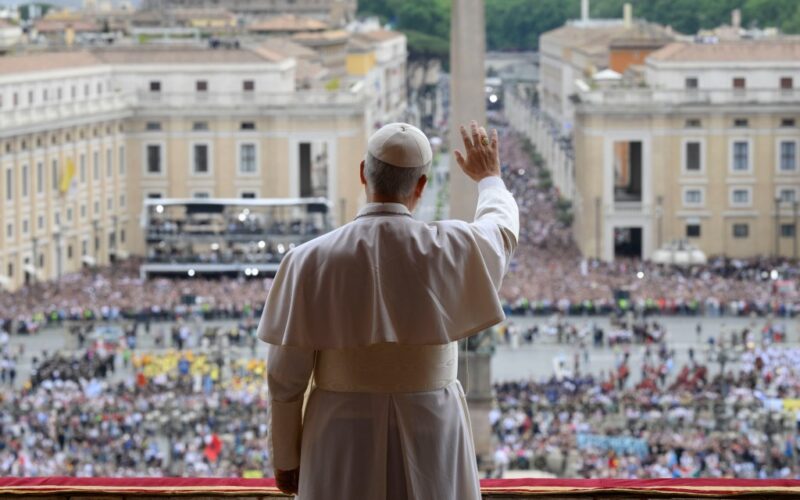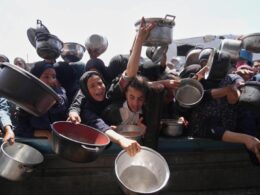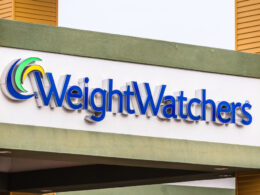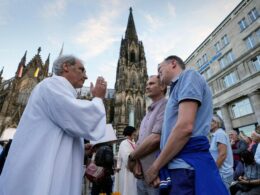Over the past 60 years, dialogue turned to action for the common good and the sake of deep and trusting friendship between Jewish and Catholic communities.
The Catholic Church is now the largest doctrinally philosemitic organization in the world, denouncing antisemitism as a “sin.” Priests can be defrocked for publicly espousing antisemitic positions.
Consecutive popes since Pope John Paul II have both visited Israel and Auschwitz, affirming that the Church no longer believes that Jews are consigned to exile from their ancestral homeland for failing to accept Jesus and that our torment during the Holocaust is antithetical to Catholicism.
Because of these remarkable transformations, when a new pope is elected, it is of key importance not only for Catholic faithful, but also their Jewish siblings. Last Thursday was historic for people around the world, as they came to know Pope Leo XIV. It is filled with hope for what he might do, and we might do together, under his leadership of the Catholic Church.
Pope Leo XIV is reputed to be an efficient manager and pragmatist who is less outspoken than some of his predecessors. He is the kind of leader who can make significant change happen quietly. He is the first American pope and served extensively in Latin America before working in Rome. Yet he appears to have little prior experience in working Jewish communities. Further, what he has said aloud already as pope merits our notice.
In his very first remarks as head of the Catholic Church, Leo called for dialogue. He made clear that he sought to serve both the Catholic Church and all of humanity. Yet he scrupulously left out specifications about with whom he sought greater dialogue.
In this way, we are left to wonder whether and how he seeks to build upon the landmark progress between Jewish and Catholic communities — and potentially expand upon it in intentional ways with Muslim leaders and even Hindus, Buddhists, and others beyond the Abrahamic traditions.
For us as Jewish communities, this poses both an opportunity and a challenge. Under Pope Leo XIV’s leadership, the Catholic Church may come to focus less on the unique historic and theological relationship between Judaism and Catholicism as sibling traditions. It may do less exploration of related histories, theologies, and approaches to faith. Likewise, it could deemphasize Jewish-Catholic relations altogether.
This pivot could become painful for Jewish communities at a time of rising antisemitism and anti-Israel zealotry around the world. At the same time, it might motivate us to redouble efforts to build bridges with other communities in local communities across North America, Israel, and around the world.
Building from a place of strength in our relationship, we would do well to take Leo at his word and, indeed, reach out to our neighbors and friends from other communities. We can do so from a posture of learning and humility, while affirming our beliefs as American Jews who care deeply about our family of families around the world — the Jewish people, including our largest center of Jewish life in the modern state of Israel.
While the transformations wrought by the Second Vatican accords were singular in how they righted historic wrongs against the Jewish people in the clearest theological terms, we can now view them as both a north star and an example of what we may yet do together.
Further, they should be reiterated and built upon, not only in Jewish-Catholic dialogue, but in dialogue between the many communities that we seek out with intention. It can now inspire Catholics and Jews alike to look beyond their own communities and forge new friendships around them, perhaps now doing so side by side.
While the change of leadership in the world’s largest religious organization always merits our attention, American Jews would do well to ensure that Jewish-Catholic dialogue remains a priority in our outreach and dialogue — and hopefully that of our Catholic counterparts.
May this be a time of continued strength for Catholic-Jewish friendship, even as both communities build upon the example of reconciliation that they set 60 years ago — with much to rejoice in together as Catholics and Jews.
Stanton, a rabbi, is associate vice president for Interfaith and Intergroup Initiatives at the Jewish Federations of North America.








